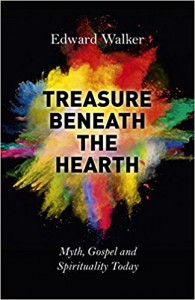Treasure beneath the hearth: Myth, gospel, and spirituality today by Edward Walker (Christian Alternative, 2015)
Review by Robert M. Ellis
A rabbi has a dream that there is treasure buried beneath the bridge in a far-off city. He makes a long journey to get there in search of the treasure, but meets a guard beneath the bridge. The guard tells him that he, too, has had a dream about buried treasure, under the hearth of a rabbi living in a far-off country. The rabbi realises his mistake and journeys home. There he digs beneath his hearth and finds the treasure.
Such is the story (from Martin Buber) that gives this book its title and theme. It’s a story that very much resonates with me, as someone from a Christian background who spent about 20 years engaged with Buddhism, but has more recently become more interested in ‘digging’ under my Christian roots. The treasure that I find under my own hearth is not one of doctrinal ‘truths’ or hysterical recognitions of Christ as my saviour, but rather one of archetypal meaning. My Christian roots mean that Christian symbols have a much greater resonance with me than Buddhist ones ever could – as I discovered even when making an extended attempt to connect with Buddhist symbols. Edward Walker writes from a similar basis of experience, having worked in the Christian ministry in South Africa but become disillusioned by the way Christianity there was used to prop up the Apartheid regime. He returned to Britain and became a religious education teacher, when, as he records “Many people asked me whether I had lost my faith, but my own perception was that, as a result of various vicissitudes, I had found it”.
The great strength of this book is that it records the thinking of someone who is deeply imbued with the Christian tradition, but whose faith has nevertheless made the important switch between absolute belief (for which ‘faith’ is often a euphemism) and a much more experiential engagement that recognises the limitations of human belief. His book is a relatively brief and accessible exploration of what it might mean to separate archetypal ‘mythos’ from ‘logos’ (in my own preferred vocabulary, meaning from belief). His argument seeks a Middle Way in many respects, though of course he does not use the term because he is reliant on more traditional Christian vocabulary. He does, at least implicitly, recognise that the metaphysics is simply an irrelevant distraction. Here’s a passage that gives a taste of this:
The argument here is not between Christian and sceptic, theist and atheist, nor to do with the existence and non-existence of God, with whether the creation of the world was a matter of chance or divine purpose, or whether man has, or has not, a soul. It has to do rather with a way of reflecting…on what it is to be human, and in the light of this what are primary and what are secondary tasks. (p.10-11)
Walker, indeed, talks about monanthropism, the unification or integration of human beings, as taking the place of monotheism. This draws on Jung’s account of the archetypal God or ‘True Self’ (a term that makes me cringe, but I understand what he means in context). The archetypal God is an experience (not primarily a concept) of potential, of how we might more fully operate beyond our current egoistic limitations. This potential or wider self is what Jesus often refers to as eternal life or the Kingdom of God.
Much of the book is concerned with using Biblical criticism to disentangle the historical Jesus from the mythic Christ, and to draw out those aspects of Jesus’ teachings, parables and prayers that might help us towards integration (what Jung tended to call ‘individuation’). He makes a striking experiment on perceptions of Jesus by asking his students to subject him to an aggression test drawn from psychology, finding that his students consistently underestimate Jesus’ level of aggression (probably substituting a ‘meek and mild’ cultural construction for what they read in the gospels). Walker’s Jesus has ‘robust adulthood’, and is a functioning model of how to develop in a complex and challenging set of conditions.
This book does have a number of limitations, but at the same time I can recognise that by not trying to do too much, Walker may have produced a more accessible book than would otherwise have been the case. Given his clear commitment to archetypal interpretation, I was disappointed by the lack of exploration of the meaning of Christ, God, or other Christian symbols along archetypal lines. Instead, there is a lot of emphasis on drawing out helpful interpretations of the historical Jesus which doesn’t quite engage with how the Christ of faith might work for Christians. In accordance with the dominant tradition of theological studies, there is a lot of emphasis on biblical criticism: which is helpful in making people understand the limitations of the biblical record, but can also maintain an implicit reliance on debatable historical claims about Jesus which archetypal Christianity does not need to be subject to.
Nevertheless, I think this book makes a very helpful contribution to gently pushing Christians in a helpful direction, in which they become aware of the possibility of archetypal interpretation as well as the need for critical perspectives on the Bible and Christian doctrine. Ultimately it’s more likely to be the positive prospect of riches beneath the hearth that may be successful in luring Christians brought up in a dogmatic tradition to open up their interpretation, the recognition that by doing so they need lose nothing of what is so preciously meaningful to them in their experience of Christianity, whilst overcoming much unnecessary conflict and repression. Rather than losing their faith, like Walker, may they find it!
